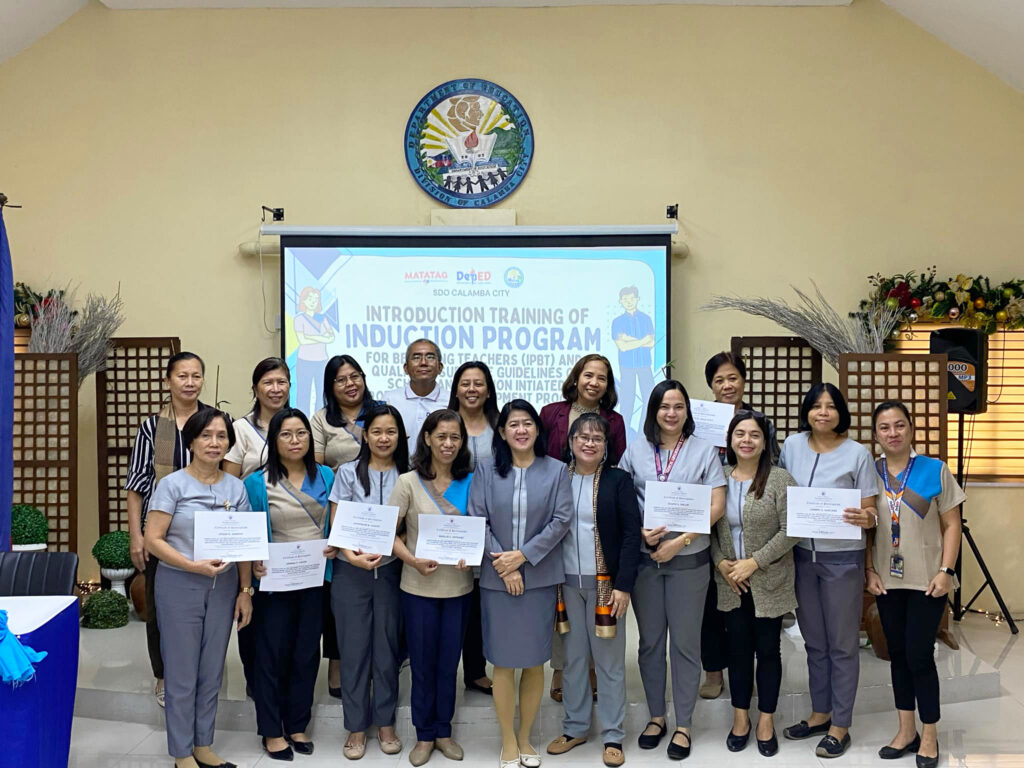
Aimed at equipping IPBT mentors and coaches with a comprehensive understanding of their roles and responsibilities, the Schools Division Office of Calamba City conducted the Orientation on the Implementation of Induction Program for Beginning Teachers and Introduction of Guidelines for Quality Assurance of School and Division-initiated Professional Development Program at Bulwagang Rizal, 4th floor of the DepEd main building on November 5-6, 2024.
In her message, OIC-ASDS Nadine C. Celindro provided an in-depth explanation of the MATATAG Agenda, highlighting its essential role in developing committed and resilient educators.
She emphasized that the agenda is a roadmap designed to strengthen the foundational values and teaching competencies needed for quality education. Through MATATAG, teachers are encouraged to cultivate a deep sense of dedication, adaptability, and excellence, which are critical in addressing the evolving challenges in the education sector.
Celindro underscored that the agenda not only supports teachers in their professional growth but also aligns their efforts with DepEd’s mission to deliver inclusive, equitable, and learner-centered education.
SGOD Chief Dolorosa S. De Castro led a detailed discussion on the legal foundations, program structure, design, activities, and roles and responsibilities associated with the Teacher Induction Program for Beginning Teachers.
In her presentation, De Castro outlined the IPBT’s conceptual framework, focusing on key components such as curriculum, delivery methods, and ecosystem support. She emphasized that IPBT integrates a variety of learning activities, including self-directed modules, job-embedded learning, mentoring and coaching, differentiated supervision, and tailored technical assistance. This multifaceted approach ensures that new teachers receive comprehensive support and guidance as they transition into the teaching profession.
The comprehensive overview of the learning resources and digital tools available to support the IPBT was provided by CID Chief Mariliza T. Espada. She introduced participants to the IPBT learning resource package, which includes a detailed guide and coursebooks specifically designed to help beginning teachers navigate their roles effectively.
Espada also conducted a walkthrough of the IPBT online portal, highlighting its user-friendly features and resources. She demonstrated how new teachers could access online quizzes, essential forms, and templates, all aimed at enhancing their learning experience and tracking their progress.
Meanwhile, SEPS Kevin A. Domingo provided a thorough explanation of DepEd Order No. 44, s. 2023, also known as the Interim Guidelines for Quality Assurance, Monitoring, and Evaluation of NEAP Core Programs. He detailed the rationale behind the issuance, emphasizing its importance in standardizing the quality and effectiveness of professional development initiatives across the Department of Education.
Domingo clarified the specific scope of DepEd Order No. 44, noting how it applies to NEAP core programs and establishes a consistent framework for evaluating these essential training programs for educators. He outlined the QAME framework, which includes structured criteria for assessing program quality, effectiveness, and alignment with DepEd’s mission of fostering educational excellence.
The quality assurance process and the tools used to maintain high standards in educational programs were facilitated by EPS-SGOD Imee P. Aldea. She detailed each step of the QA process, explaining how it ensures that all programs and initiatives meet DepEd’s quality benchmarks for effectiveness and relevance.
Aldea introduced various QA tools that play a crucial role in assessing program components, such as checklists, evaluation forms, and performance rubrics. She highlighted how these tools enable systematic tracking and evaluation, providing educators and program implementers with clear criteria for assessing program success and areas for improvement.
The last part of the program focused on the in-depth presentation on the quality standards for professional development learning resource materials discussed by EPS-English Andrea C. Señadoza. She highlighted the criteria and benchmarks that ensure these resources are effective, accessible, and aligned with DepEd’s educational objectives.
Señadoza explained that each PD learning resource is meticulously designed to meet high standards in content accuracy, instructional clarity, and relevance to teachers’ needs. She underscored that these materials are tailored to enhance educators’ skills and competencies, making them practical for classroom application.
